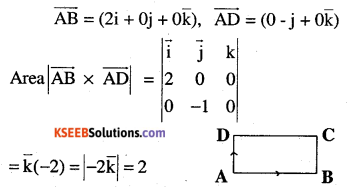Students can Download Maths Chapter 10 Vector Algebra Ex 10.4 Questions and Answers, Notes Pdf, 2nd PUC Maths Question Bank with Answers helps you to revise the complete Karnataka State Board Syllabus and score more marks in your examinations.
Karnataka 2nd PUC Maths Question Bank Chapter 10 Vector Algebra Ex 10.4
2nd PUC Maths Vector Algebra NCERT Text Book Questions and Answers Ex 10.4
Question 1.
Find
\(|\vec{a} \times \vec{b}|, \text { if } \vec{a}=\hat{i}-7 \hat{j}+7 \hat{k} \text { and }\overrightarrow{\mathbf{b}}=3 \hat{\mathbf{i}}-2 \hat{\mathbf{j}}+2 \hat{\mathbf{k}}\)
Answer:
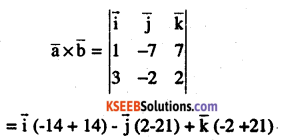

Question 2.
Find a unit vector perpendicular to each of the vector \(\overrightarrow{\mathbf{a}}+\overrightarrow{\mathbf{b}} \quad \text { and } \quad \overrightarrow{\mathbf{a}}-\overrightarrow{\mathbf{b}}\) where \(\vec{a}=3 \hat{i}+2 \hat{j}+2 \hat{k}, \text { and } \vec{b}=\hat{i}+2 \hat{j}-2 \hat{k}\)
Answer:
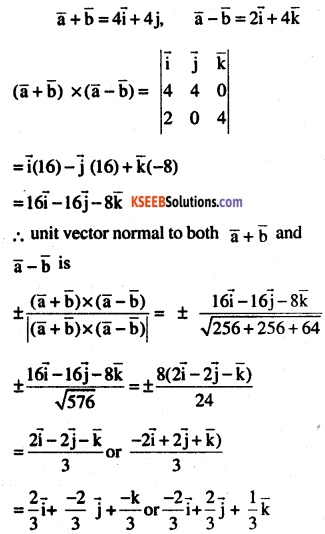
![]()
Question 3.
If a unit vector \(\overrightarrow{\mathrm{a}}\) makes angles \(\frac{\pi}{3} \text { with } \hat{\mathbf{i}}, \frac{\pi}{4}\) with \(\hat{\mathbf{j}}\) and acute angle θ with \(\hat{\mathbf{k}}\) then find θ and hence, the component of \(\overrightarrow{\mathrm{a}}\)
Answer:
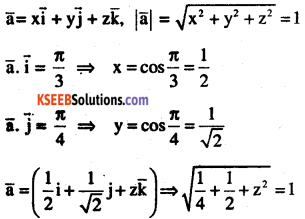
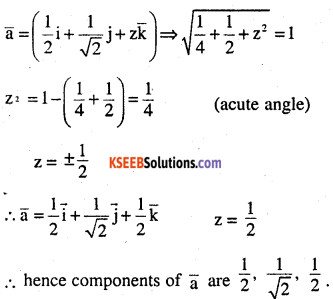
Question 4.
Show that
\((\overline{\mathbf{a}}-\overline{\mathbf{b}}) \times(\overline{\mathbf{a}}+\overline{\mathbf{b}})=\mathbf{2}(\overline{\mathbf{a}} \times \overline{\mathbf{b}})\)
Answer:
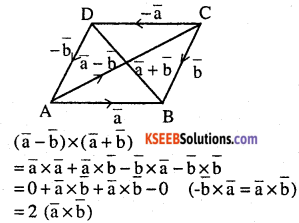
Question 5.
Find λ and μ if
\((2 \hat{\mathbf{i}}+6 \hat{\mathbf{j}}+27 \hat{\mathbf{k}}) \times(\hat{\mathbf{i}}+\lambda \hat{\mathbf{j}}+\mu \hat{\mathbf{k}})=\overrightarrow{\mathbf{0}}\)
Answer:
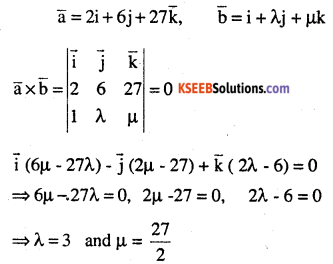
![]()
Question 6.
Given that \(\overrightarrow{\mathbf{a}} \cdot \overrightarrow{\mathbf{b}}=\mathbf{0} \text { and } \overrightarrow{\mathbf{a}} \times \overrightarrow{\mathbf{b}}=\overrightarrow{\mathbf{0}}\). when can you conclude about the vectors \(\overrightarrow{\mathbf{a}} \text { and } \overrightarrow{\mathbf{b}}\)
Answer:
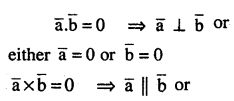
either \(\bar{a}=0 \text { or } \bar{b}=0\)
They can’t be parallel and perpendicular at the same time.
∴ At least one of \(\bar{a} \text { and } \bar{b} \)is zero vector.
Question 7.
Let the vector \(\overrightarrow{\mathrm{a}}, \overrightarrow{\mathrm{b}}, \overrightarrow{\mathrm{c}}\) be given as \(\mathbf{a}_{1} \hat{\mathbf{i}}+\mathbf{a}_{2} \hat{\mathbf{j}}+\mathbf{a}_{3} \hat{\mathbf{k}}, \mathbf{b}_{1} \hat{\mathbf{i}}+\mathbf{b}_{2} \hat{\mathbf{j}}+\mathbf{b}_{3} \hat{\mathbf{k}}, \mathbf{c} \hat{\mathbf{i}}+\mathbf{c}_{2} \hat{\mathbf{j}}+\mathbf{c}_{3} \hat{\mathbf{k}}\). Then show that \(\overrightarrow{\mathbf{a}} \times(\overrightarrow{\mathbf{b}}+\overrightarrow{\mathbf{c}})=\overrightarrow{\mathbf{a}} \times \overrightarrow{\mathbf{b}}+\overrightarrow{\mathbf{a}} \times \overrightarrow{\mathbf{c}}\)
Answer:
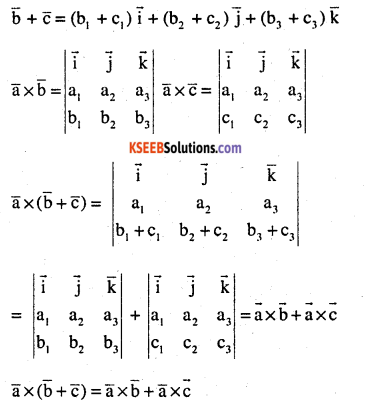
Question 8.
If either\(\overrightarrow{\mathrm{a}}=\overrightarrow{0} \text { or } \overrightarrow{\mathrm{b}}=\overrightarrow{0}, \text { then } \overrightarrow{\mathrm{a}} \times \overrightarrow{\mathrm{b}}=\overrightarrow{0}\). Is the converse true? Justify your answer with an example.
Answer:

![]()
Question 9.
Find the area of the triangle with vertices A (1, 1, 2), B (2, 3, 5) and C (1, 5, 5).
Answer:
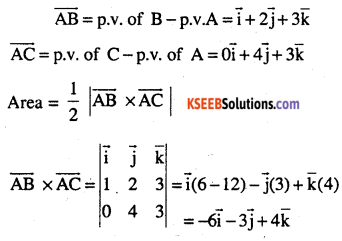
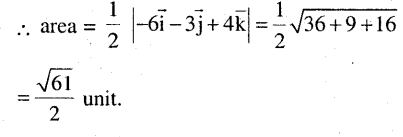
Question 10.
Find the area of the parallelogram whose adjacent sides are determined by the vectors a
\(\overrightarrow{\mathrm{a}}=\hat{\mathbf{i}}-\hat{\mathbf{j}}+3 \hat{\mathbf{k}} \text { and } \overrightarrow{\mathbf{b}}=2 \hat{\mathbf{i}}-7 \hat{\mathbf{j}}+\hat{\mathbf{k}}\)
Answer:
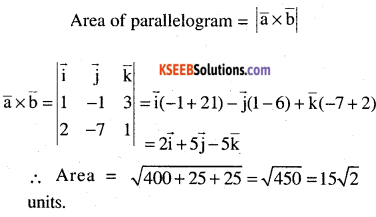
Question 11.
Let the vector \(\overrightarrow{\mathbf{a}} \text { and }\overrightarrow{\mathbf{b}}\) be such that \(|\vec{a}|=3 \text { and }|\vec{b}|=\frac{\sqrt{2}}{3}, \text { then } \vec{a} \times \vec{b}\) is a unit vector ,if angle between \(\overrightarrow{\mathbf{a}} \text { and } \overrightarrow{\mathbf{b}} \text { is }\)
(A) \(\pi / 6\)
(B) \(\pi / 4\)
(C) \(\pi / 3\)
(D) \(\pi / 2\)
Answer:
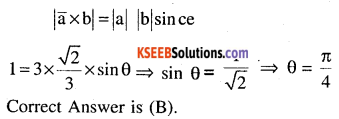
![]()
Question 12.
Area of a rectangle having vertices A, B, C and D with position vectors
\(\begin{aligned}&-\hat{\mathbf{i}}+\frac{1}{2} \hat{\mathbf{j}}+4 \hat{\mathbf{k}}, \hat{\mathbf{i}}+\frac{1}{2} \hat{\mathbf{j}}+4 \hat{\mathbf{k}}, \hat{\mathbf{i}}-\frac{1}{2} \hat{\mathbf{j}}+4 \hat{\mathbf{k}} \text { and }\\&-\hat{\mathbf{i}}-\frac{1}{2} \hat{\mathbf{j}}+4 \hat{\mathbf{k}}, \text { respectively is }\end{aligned}\)
(A) \(\frac{1}{2}\)
(B) 1
(C) 2
(D) 3
Answer:
